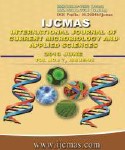


 National Academy of Agricultural Sciences (NAAS)
National Academy of Agricultural Sciences (NAAS)

|
PRINT ISSN : 2319-7692
Online ISSN : 2319-7706 Issues : 12 per year Publisher : Excellent Publishers Email : editorijcmas@gmail.com / submit@ijcmas.com Editor-in-chief: Dr.M.Prakash Index Copernicus ICV 2018: 95.39 NAAS RATING 2020: 5.38 |
The front line demonstrations (FLD’s) on Arka Rakshak F1 Hybrid of tomato were conducted by Krishi Vigan Kendra of Ramanagara District, Karnataka. Akra Rakshak, a triple disease resistant (bacterial wilt, early blight and leaf curl virus) hybrid was released by Indian Institute of Horticultural Research (IIHR), Bengaluru. Improved crop management practices were demonstrated in farmers field for three consecutive years from 2014-15 to 2016-17. As an outcome of FLD, it was noticed that the average per cent Bacterial wilt affected plants was low in demo plots (1.4%) compared to farmer’s practice plots (14.43%) which was used as check. The timely plant protection measures along with marigold as trap crop reduced the average per cent fruits damaged by fruit borer in demo plots (2.27%) compared to farmers practice (11.70%). The per cent increase in fruit yield is 57.34 for the three years from demo plots over the farmer’s practice. The other parameters like extension gap, technology gap and technology index were derived for the assessment of technology adoption rate. The average technology gap and technology index were 14.86 and 18.58 per cent respectively. The Benefit: Cost ratio of tomato cultivation during 2014-15, 2015-16 and 2016-17 under demonstrations were 4.11, 4.13 and 4.75, respectively while it was 3.01, 3.02 and 3.73 under farmers practice for the respective years. The results clearly showed the positive impact of front line demonstrations over farmers practice towards increasing the productivity of tomato in Ramanagara district of Karnataka State. On an average 57.39% yield increase was observed in demo plots over farmers practice. Demonstrated technologies proved more remunerative and economically feasible to the tomato growers than their conventional methods.
 |
 |
 |
 |
 |